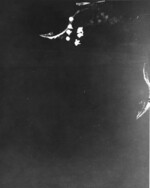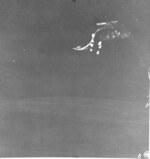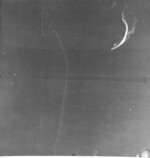Tone
| Country | Japan |
| Ship Class | Tone-class Heavy Cruiser |
| Laid Down | 1 Dec 1934 |
| Launched | 21 Nov 1937 |
| Commissioned | 20 Nov 1938 |
| Sunk | 24 Jul 1945 |
| Displacement | 15,200 tons standard |
| Length | 650 feet |
| Beam | 61 feet |
| Draft | 21 feet |
| Speed | 35 knots |
| Crew | 850 |
| Armament | 8x8in guns, 8x5in guns, 57x25mm anti-aircraft, 12x24in torpedo tubes |
| Aircraft | Aichi E13A and Nakajima E8N reconnaissance flying boats |
Contributor: C. Peter Chen
ww2dbaseNamed after a river, the heavy cruiser Tone participated in the attack on Pearl Harbor as escort to the six aircraft carriers, and launched her seaplanes to scout Wake Island immediately before its invasion. Upon returning to South Pacific, she participated in a series of attacks that expanded Japan's control of the sea into the Indian Ocean to the west and Java to the south. At Midway, Tone's reconnaissance planes discovered several American ships but failed to recognized them as part of a carrier group. After Midway, she was involved in many campaigns, including the Solomons and the daring counterattack on the American invasion of the Philippines (which failed despite of the tactical victory off Samar which Tone was a part of).
ww2dbaseTone was in Hiroshima Bay in Jul 1945 when American aircraft attacked the remnants of the Japanese Navy there. She was hit by three bombs from planes from USS Monterey, and sank in the shallow bay. With its superstructure still showing on the surface, she continued to be a target of attack in the subsequent bombing run several days later.
ww2dbaseSource: Wikipedia.
Last Major Revision: Sep 2005
Heavy Cruiser Tone Interactive Map
Photographs
 |  |  |  |
Tone Operational Timeline
| 20 Nov 1938 | Tone was commissioned into service. |
| 24 Jul 1945 | British TF 37 launched 416 sorties, 261 of which were sent against the Japanese home islands and 155 were for defensive patrols; escort carrier Kaiyo was damaged by British carrier planes. On the same day, American TF 38 launched 600 aircraft against Kure, Nagoya, Osaka, and Miho, sinking battleship-carrier Hyuga, heavy cruiser Tone, and target ship Settsu, and damaging carrier Ryuho, carrier Amagi, battleship-carrier Ise, battleship Haruna, heavy cruiser Aoba, light cruiser Oyodo, transport Kiyokawa Maru; the Aichi aircraft factories at Nagoya were seriously damaged. |
Did you enjoy this article or find this article helpful? If so, please consider supporting us on Patreon. Even $1 per month will go a long way! Thank you. Share this article with your friends: Stay updated with WW2DB: |
Visitor Submitted Comments
All visitor submitted comments are opinions of those making the submissions and do not reflect views of WW2DB.
» Kobe, Yuji
Event(s) Participated:
» Attack on Pearl Harbor
» Battle of Wake Island
» New Guinea-Papua Campaign, Phase 1, Bismarck Islands
» Dutch East Indies Campaign, Java
» Attack on Darwin
» Raids into the Indian Ocean
» Battle of Midway and the Aleutian Islands
» Solomon Islands Campaign
» Philippines Campaign, Phase 1, the Leyte Campaign
» Preparations for Invasion of Japan
Partner Sites Content:
» Tone Tabular Record of Movement
- » 1,150 biographies
- » 337 events
- » 43,918 timeline entries
- » 1,241 ships
- » 350 aircraft models
- » 207 vehicle models
- » 375 weapon models
- » 123 historical documents
- » 260 facilities
- » 470 book reviews
- » 28,563 photos
- » 432 maps
Chiang Kaishek, 31 Jul 1937
Please consider supporting us on Patreon. Even $1 a month will go a long way. Thank you!
Or, please support us by purchasing some WW2DB merchandise at TeeSpring, Thank you!
21 Feb 2009 11:45:53 AM
Would like to have seen a photo. Short history about the Tone. built by Mitsubishi 1934, Displ. 15,200 tons, Lenght 649ft,Speed 35.2kts., Range 9,000nm., Armament 8x203mm (8in),8x127mm (5in),12x25mm anti-aircraftguns,4x3 610mm (nominal rotating TT)5 aircraft, 2 catapults. Launched 21 Nov. 1937 completed 20 Nov. 1938. Sunk 24 July 1945 shallow water near Kure,Japan salvaged and broken up 1948. The Tone paricipated in the Peal Harbor attack and launched seaplanes on 8 Dec. to recon. damage to the U.S. Pacific Fleet, she particpated in many operations during the Pacific War.